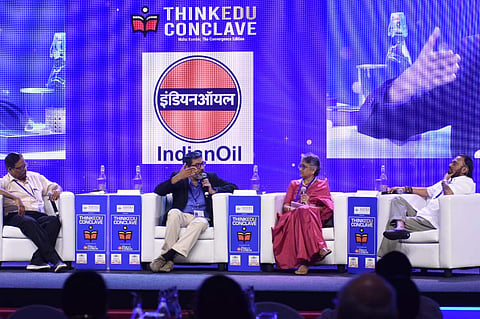

There is a pressing need for data-driven solutions to tackle the escalating number of students suicides to understand the underlying problems, opined panellists during the second day of the 13th ThinkEdu Conclave 2024, presented by SASTRA University, in Chennai on Thursday.
The session “Combating Student Suicides: What Can Institutes Do Better?” delved into the sensitive issue of student suicides, bringing together three eminent experts – Dr Soumitra Pathare, director, Centre For Mental Health Law and Policy, Pune, Dr Saras Bhaskar, counselling psychologist and Dr M Malaiappan, director, Institute of Mental Health – to discuss the rising concern and potential strategies for resolution. The session was chaired by Ravi Shankar, Consulting Editor, Sunday Standard.
Dr Pathare urged caution against jumping to conclusions based on anecdotal evidence.
“We must rely on data to dissect the root causes of this issue. More young girls succumb to suicide before the age of 19 than boys, surpassing even maternal mortality as the primary cause of death. This underscores the imperative for a solution-oriented approach grounded in comprehensive data analysis,” said Pathare.
Highlighting a successful case study, Dr Pathare commended the Tamil Nadu government’s approach to reducing student suicides through data-driven policies. He noted that the introduction of a supplementary exam after board exams resulted in a significant 50% decrease in suicide rates among students.
The experts engaged in a comprehensive discussion on how institutions can implement policies based on robust data to formulate concrete solutions to address the complex issue of student suicides.
The insightful deliberations on Day 2 of the conclave underscored the importance of adopting evidence-based strategies to combat the alarming rise in student suicides.
Student suicides multi-factorial; Influenced by major global changes
The rising trend of student suicides took center stage at the ThinkEdu Conclave 2024, with experts shedding light on various contributing factors and proposing solutions to address this pressing issue. Dr Malaiappan noted that the surge in student suicides is multi-factorial, influenced by major global changes and economic turbulence.
During the discussion, Dr Bhaskar underscored the decline in patience, tolerance, and perseverance among students. She emphasised the detrimental role of bullying on campuses and advocated for a collaborative work environment to contain such issues. Dr Bhaskar stressed – “Heightened awareness, extending from the security guard and teachers to lab technicians and all staff members, is imperative for recognizing and responding to warning signals.”
The crucial question of whether institutes can implement effective programs to address the issue was raised during the panel. In response, Dr Pathare highlighted the importance of gatekeeper training programs for school teachers. He proposed making this training compulsory, citing its low cost and high effectiveness. Dr Pathare also suggested the development of peer counseling services, stating, “A 20-year-old might find it difficult to speak to a 40-year-old, but they might not hesitate to confide in someone from their generation.”
Is suicide prevention an easy task?
Dr Malaiappan believes it requires a comprehensive approach, addressing all aspects of society to yield a significant impact in curbing the alarming rates of suicide. “As a society, we must strive towards cultivating a culture of equality and non-discrimination,” he advocates.
Dr Bhaskar contributed to the discussion, focusing on efforts at the school level where the urgency of the situation has prompted action.
“The inclusion of guidance counselors in schools has not only benefited students directly but has also sensitised parents to their children's needs, allowing them to pursue paths aligned with their skillsets,” she said.
As the conversation revolved around institutional awareness, Dr Pathare emphasised the necessity of dispelling certain myths prevalent in managing students at higher educational institutions.
“The misconception that only academically weak students are prone to suicide must be debunked. Additionally, the belief that top administrative officials can dismiss the issue by turning a blind eye is another myth that needs correction,” he said.
Closing the session, Dr Pathare asserted that suicide should be immediately recognised as a public health issue, with suicide prevention being viewed as a public health solution. The experts' insights shed light on the complexity of suicide prevention and the crucial need for widespread societal and institutional changes to address this pressing public health concern.
Suicide helpline nos:
Aasra – 91-9820466726
NIMHANS – 91-8046110007
Vandrevala – 91-9999666555
